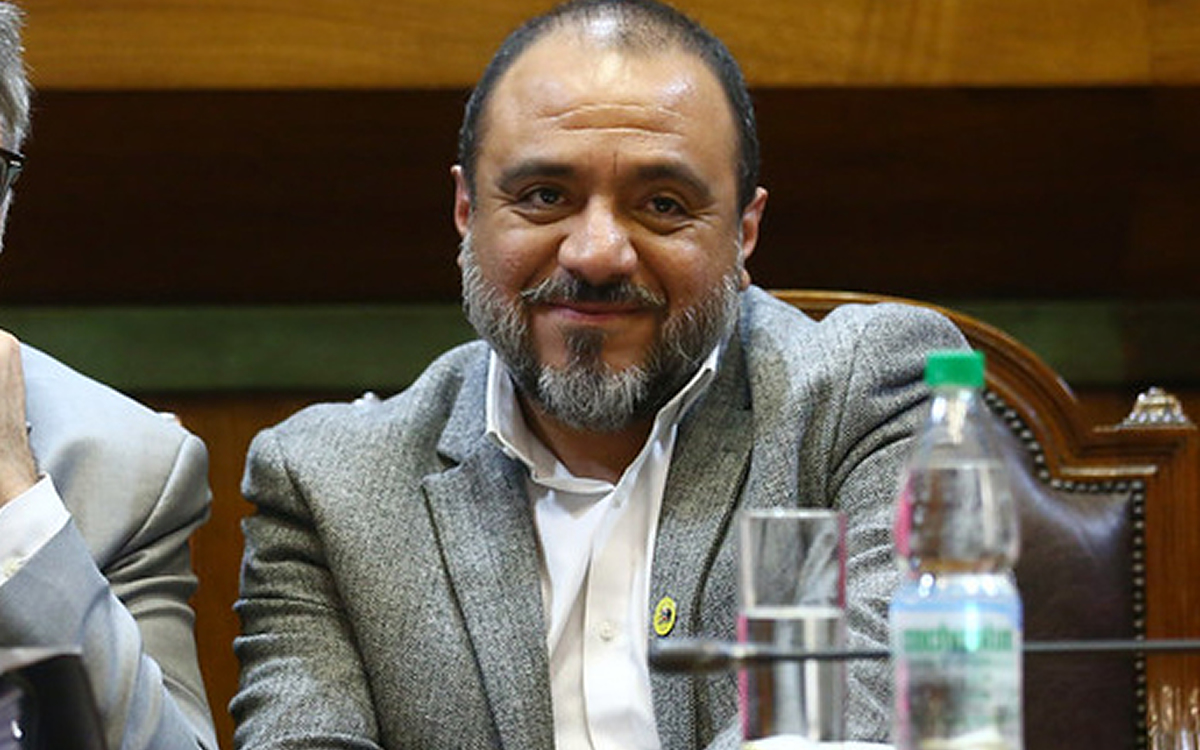South America
Chilean lawmakers reject complaint against gay education minister
Marco Antonio Ávila faced insults about sexual orientation

The Chilean Congress on Wednesday rejected a complaint against openly gay Education Minister Marco Antonio Ávila that a group of conservative lawmakers filed against him.
President Gabriel Boric himself denounced and repudiated the series of homophobic statements against his Cabinet member.
The traditional right and the extreme right voted as a block in favor of dismissing Ávila. They accused him of infringing upon parents’ rights to educate their children and failing to fulfill his responsibilities to address an alleged “deep educational crisis.”
Lawmakers voted 78-69 to reject the complaint that 10 conservative lawmakers filed.
Four of the complaint’s seven chapters contained references to the Education Ministry’s gender or sexual education policies they said Ávila implemented. These policies, however, have been in place since leftist President Michelle Bachelet and right-wing President Sebastián Piñera were in office.
“I have never broken the laws or (violated) the constitution,” said Ávila after the vote. “I am a firm defender of democracy, of the constitution and of the tools it contains to control and improve the actions of authorities. But I am also certain that it is through constructive dialogue that the vast majority of those of us who participate in politics can move forward to improve the lives of hundreds and thousands of students, children and young people.”
Boric on Twitter reiterated his rejection of the accusation against Ávila and once again emphasized those who brought it showed “homophobic character.”
“The constitutional complaint against the Education Minister and professor Marco Ávila is the fourth filed by the right wing in less than a year and a half of government has been rejected,” wrote Boric. “Its lack of legal support and homophobic character were on display. Justice and reason have triumphed.”
Congress seemed poised to approve the complaint until the lawmakers who introduced it invited Christian Legislative Observatory Director Marcela Aranda to testify against Ávila.
Aranda is the former spokesperson of the Freedom Bus, which Hazte Oir, an ultra-Catholic organization from Spain, brought to Chile in 2017.
She testified that Avila’s “LGTBIQ+ activism and his condition has exceeded the limit of what is private.” Congresswoman María Luisa Cordero accused Ávila of encouraging child perversion.
“I find it unusual, inadmissible, nauseating and disgusting that the Minister of Education … is concerned about the incitement to sexuality and whether they have an active and reactive clitoris … I would have already asked for the famous Ávila to be imprisoned for inciting precocity and child sexual perversion if he were not Education Minister,” said the congresswoman.
She added Ávila “is a fatty liver patient with high bilirubin levels.”
“This attacks the neurons and causes mental incompetence,” said Cordero. “He is a person about whom nobody worries because he should be evaluated physically and biologically.”
Ávila (and his ministry), according to Cordero “has a perverse preoccupation with the sexual anticipation and development of schoolchildren.”
“They are a bunch of perverts who work from the crotch.”
Her statements, which El Mercurio, Chile’s leading conservative newspaper, and LGBTQ and intersex organizations documented, made lawmakers from Evópoli, a center-right party, and from the center-left Christian Democracy Party, which is not part of the government, reevaluate whether to vote in favor of dismissing Ávila. The coalitions votes were key.
The Movement for Homosexual Integration and Liberation condemned the anti-gay statements.
“The statements of these people, especially Cordero, are clearly a response to the minister’s sexual orientation and the policies of the Education Ministry to promote LGBTIQ+ human rights,” said Movilh. “These are homophobic speeches that go as far as the irrationality of insulting an authority with child abuse just for being gay.”
Fundación Iguales Executive Director María José Cumplido told the Washington Blade “it is very good news that the constitutional complaint has been rejected because it had no legal arguments and instead was a ruse to personally attack the minister for his sexual orientation. Therefore, from Fundación Iguales’ persepctive we celebrate that there has been a rejection to those homophobic attacks that personally attacked Minister Ávila.”
Emilia Schneider, a pro-government congresswoman, pointed out to the Blade that “the constitutional accusation against Minister Antonio Ávila was rejected for being an accusation without legal grounds, based on lies and homophobia.”
Schneider is the first transgender woman to win a seat in the Chilean Congress.
“It is a very good sign that the National Congress in its majority is not supportive of this civilizational setback, I regret that we have wasted time in this show of the right and ultra-right,” Schneider emphasized.
Finally, Ávila said that “my call today, after this accusation, is to improve (the treatment of people) in the political world, to respect each other beyond differences, not to turn the fair differences between one and the other into personal attacks.”
Colombia
Gay Venezuelan opposition leader: Country’s future uncertain after Maduro ouster
Yendri Velásquez fled to Colombia in 2024 after authorities ‘arbitrarily detained’ him

A gay Venezuelan opposition leader who currently lives in Colombia says his country’s future is uncertain in the wake of now former President Nicolás Maduro’s ouster.
The Washington Blade spoke with Yendri Velásquez on Thursday, 12 days after American forces seized Maduro and his wife, Cilia Flores, at their home in Caracas, the Venezuelan capital, during an overnight operation.
Maduro and Flores on Jan. 5 pleaded not guilty to federal drug charges in New York. The Venezuelan National Assembly the day before swore in Delcy Rodríguez, who was Maduro’s vice president, as the country’s acting president.
Velásquez, who lives in the Colombian capital of Bogotá, described the events surrounding Maduro’s ouster as “very confusing.”
“It was a very surprising thing that left me in shock,” Velásquez told the Blade. “We also thought, at least from the perspective of human rights, that the United States was going to respect international law and not go to the extreme of bombing and extracting Maduro.”
“Other questions also arise,” he added. “What could have been done? What else could have been done to avoid reaching this point? That is the biggest question posed to the international community, to other countries, to the human rights mechanisms we established before Trump violated international law, precisely to preserve these mechanisms and protect the human rights of Venezuelan people and those of us who have been forced to flee.”
Velásquez three years ago founded the Venezuelan Observatory of LGBTIQ+ Violence. He also worked with Tamara Adrián, a lawyer who in 2015 became the first openly transgender woman elected to the Venezuelan National Assembly, for more than a decade.
Members of Venezuela’s military counterintelligence agency, known by the Spanish acronym DGCIM, on Aug. 3, 2024, “arbitrarily detained” Velásquez as he was trying to leave the country to attend a U.N. human rights event in Geneva.
Velásquez told the Blade he was “forcibly disappeared” for nearly nine hours and suffered “psychological torture.” He fled to Colombia upon his release.
Two men on Oct. 14, 2025, shot Velásquez and Luis Peche Arteaga, a Venezuelan political consultant, as they left a Bogotá building.
The assailants shot Velásquez eight times, leaving him with a fractured arm and hip. Velásquez told the Blade he has undergone multiple surgeries and has had to learn how to walk again.
“This recovery has been quite fast, better than we expected, but I still need to finish the healing process for a fractured arm and complete the physical therapy for the hip replacement I had to undergo as a result of these gunshots,” he said.

María Corina Machado, who won the 2025 Nobel Peace Prize, and other Venezuelan opposition leaders said Maduro’s government targeted Velásquez and Peche. Colombian President Gustavo Petro and his government also condemned the attack.
Colombian authorities have yet to arrest anyone in connection with the attack.
Velásquez noted to the Blade he couldn’t sleep on Jan. 3 because “of the aches and pains” from the shooting. He said a friend who is “helping me out and looking after my things” was the one who told him about the operation the U.S. carried out to seize Maduro and Flores.
“He said, ‘Look at this! They’re bombing Caracas! And I was like, ‘What is this?'” recalled Velásquez.
White House ‘not necessarily’ promoting human rights agenda
Velásquez noted Rodríguez “is and forms part of the mechanisms of repression” that includes DGCIM and other “repressive state forces that have not only repressed, but also tortured, imprisoned, and disappeared people simply for defending the right to vote in (the) 2024 (election), simply for protesting, simply for accompanying family members.” Velásquez told the Blade that “there isn’t much hope that things will change” in Venezuela with Rodríguez as president.
“Let’s hope that countries and the international community can establish the necessary dialogues, with the necessary intervention and pressure, diplomatically, with this interim government,” said Velásquez, who noted hundreds of political prisoners remain in custody.
He told the Blade the Trump-Vance administration does not “not necessarily” have “an agenda committed to human rights. And we’ve seen this in their actions domestically, but also in their dealings with other countries.”
“Our hope is that the rest of the international community, more than the U.S. government, will take action,” said Velásquez. “This is a crucial moment to preserve democratic institutions worldwide, to preserve human rights.”
Velásquez specifically urged the European Union, Colombia, Brazil, and other Latin American countries “to stop turning a blind eye to what is happening and to establish bridges and channels of communication that guarantee a human rights agenda” and to try “to curb the military advances that the United States may still be considering.”

Velásquez told the Blade he also plans to return to Venezuela when it is safe for him to do so.
“My plan will always be to return to Venezuela, at least when it’s no longer a risk,” he said. “The conditions aren’t right for me to return because this interim government is a continuation of Maduro’s government.”
Editor’s note: International News Editor Michael K. Lavers was on assignment in Bogotá, Colombia, from Jan. 5-10.
Venezuela
AHF client in Venezuela welcomes Maduro’s ouster
‘This is truly something we’ve been waiting for’ for decades

An AIDS Healthcare Foundation client who lives in Venezuela told the Washington Blade he welcomes the ouster of his country’s former president.
The client, who asked the Blade to remain anonymous, on Thursday said he felt “joy” when he heard the news that American forces seized Nicolás Maduro and his wife, Cilia Flores, at their home in Caracas, the Venezuelan capital, during an overnight operation on Jan. 3.
“This is truly something we’ve been waiting for for 26 or 27 years,” the AHF client told the Blade.
Hugo Chávez became Venezuela’s president in 1999. Maduro succeeded him in 2013 after he died.
“I’ve always been in opposition,” said the AHF client, who stressed he was speaking to the Blade in his personal capacity and not as an AHF representative. “I’ve never agreed with the government. When I heard the news, well, you can imagine.”
He added he has “high hopes that this country will truly change, which is what it needed.”
“This means getting rid of this regime, so that American and foreign companies can invest here and Venezuela can become what it used to be, the Venezuela of the past,” he said.
The AHF client lives near the Colombia-Venezuela border. He is among the hundreds of Venezuelans who receive care at AHF’s clinic in Cúcuta, a Colombian city near the Táchira River that marks the border between the two countries.
The Simón Bolívar Bridge on the Colombia-Venezuela border on May 14, 2019. (Washington Blade video by Michael K. Lavers)
The AHF client praised U.S. President Donald Trump and reiterated his support for the Jan. 3 operation.
“It was the only way that they could go,” he said.
The Venezuelan National Assembly on Jan. 4 swore in Delcy Rodríguez, who was Maduro’s vice president, as the country’s acting president. The AHF client with whom the Blade spoke said he is “very optimistic” about Venezuela’s future, even though the regime remains in power.
“With Maduro leaving, the regime has a certain air about it,” he said. “I think this will be a huge improvement for everyone.”
“We’re watching,” he added. “The actions that the United States government is going to implement regarding Venezuela give us hope that things will change.”
Colombia
Colombians protest against Trump after he threatened country’s president
Tens of thousands protested the US president in Bogotá

BOGOTÁ, Colombia — Tens of thousands of people on Wednesday gathered in the Colombian capital to protest against President Donald Trump after he threatened Colombian President Gustavo Petro.
The protesters who gathered in Plaza Bolívar in Bogotá held signs that read, among other things, “Yankees go home” and “Petro is not alone.” Petro is among those who spoke.
The Bogotá protest took place four days after American forces seized now former Venezuelan President Nicolás Maduro and his wife, Cilia Flores, at their home in Caracas, the Venezuelan capital, during an overnight operation.
The Venezuelan National Assembly on Sunday swore in Delcy Rodríguez, who was Maduro’s vice president, as the country’s acting president. Maduro and Flores on Monday pleaded not guilty to federal drug charges in New York.
Trump on Sunday suggested the U.S. will target Petro, a former Bogotá mayor and senator who was once a member of the M-19 guerrilla movement that disbanded in the 1990s. Claudia López, a former senator who would become the country’s first female and first lesbian president if she wins Colombia’s presidential election that will take place later this year, is among those who criticized Trump’s comments.
The Bogotá protest is among hundreds against Trump that took place across Colombia on Wednesday.
Petro on Wednesday night said he and Trump spoke on the phone. Trump in a Truth Social post confirmed he and his Colombian counterpart had spoken.
“It was a great honor to speak with the president of Colombia, Gustavo Petro, who called to explain the situation of drugs and other disagreements that we have had,” wrote Trump. “I appreciated his call and tone, and look forward to meeting him in the near future. Arrangements are being made between Secretary of State Marco Rubio and the foreign minister of Colombia. The meeting will take place in the White House in Washington, D.C.”





















